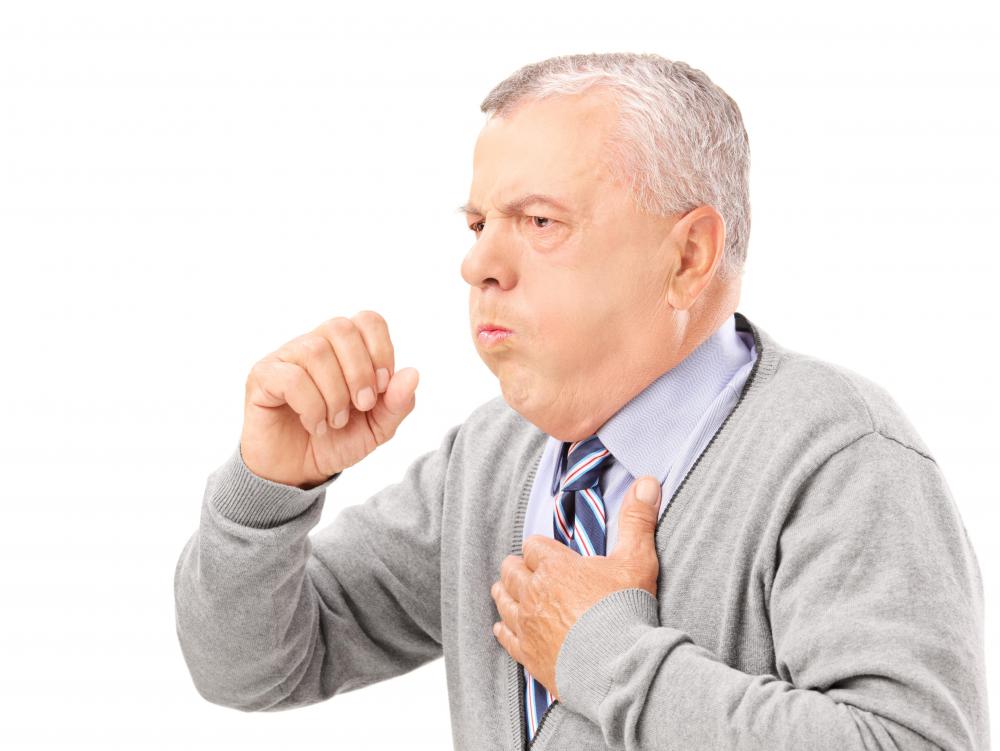At WiseGEEK, we're committed to delivering accurate, trustworthy information. Our expert-authored content is rigorously fact-checked and sourced from credible authorities. Discover how we uphold the highest standards in providing you with reliable knowledge.
What Is a Post-Viral Cough?
A post-viral cough is a dry cough that persists for more than eight weeks after an upper respiratory infection caused by a virus. This can be irritating for the patient, especially because it may be difficult to treat by conventional means. For a severe cough, a medical evaluation can confirm that an underlying problem isn’t responsible, and the patient can be provided with some aggressive treatment options to see if the issue is resolved. Otherwise, the patient may have to allow the cough to run its course.
The precise causes of post-viral cough are not well understood. Researchers believe it may be related to the inflammation in the airway caused by the infection, which can excite cells and signaling pathways involved in the cough reflex. After the infection resolves, the patient may continue to cough. Initially the cough can include mucus and particulates as the airways clear. Later, it resolves into a dry, non-productive cough, indicating that the airways may be irritated but aren’t producing more mucus.

This cough can be worse in very dry environments, and may be triggered by talking or eating. Some patients with a post-viral cough find it helpful to drink plenty of fluids to stay hydrated. Cough lozenges are typically not effective, and measures like steam tents may offer limited comfort. If the cough becomes severe, the patient could have difficulty sleeping or exercising because of the throat irritation.

In the event a patient needs more aggressive treatment, the best option is usually a cough syrup that contains codeine. Opioids suppress the cough reflex and can keep a post-viral cough down while the airways recover. Such products need to be used with care and the patient may need to taper off at the end of the course of medication to prevent withdrawal symptoms. It’s also advisable not to save or share the medication, as this could result in inappropriate use that might be dangerous.

Cases of post-viral cough may be carefully evaluated to see if the patient has asthma, an airway obstruction, or another problem. These issues may have been masked before, or might have been triggered by the infection. Such workups can include imaging of the lungs, spirometry studies to assess airway function, and a careful patient interview to look for tell-tale symptoms that may not have been identified and addressed earlier. If the cause is something other than a virus, other treatments may be necessary to resolve the issue and help the patient recover from the cough.
AS FEATURED ON:
AS FEATURED ON:















Discussion Comments
I took a short course in naturopathy many years ago and amongst the advice was the following for post nasal drip and the hacking cough which could be associated with it. Fenugreek capsules - one, two or three times a day should dry up the mucus, but not permanently. The other things to take are garlic oil capsules (better than tablets) one, two or three times a day and if still having problems after a week or so, take golden seal capsules at least one a day. The last one is more expensive so only get that if the others don't work. I have cured myself, my sister and a few friends. Good luck. -- GB
If you have a cough months after having a bad cold, it might not be just a post-viral cough. I had this happen to me, and it was actually a bacterial infection.
While I had the cold, my body made so much mucus that my sinuses became really irritated. Sometime after the virus left my body, I developed a sinus infection. I had to have antibiotics to get better.
@seag47 – Bronchitis causes a cough that seems to last forever. I've had bronchitis a couple of times in my life, and I actually had a little bit of a cough with phlegm for years after a bad case of it.
Of course, the most intense part of the cough is while the virus is still working on my system. I can't sleep because I can't get a good breath, and every time I try to breath, I have a coughing fit.
It took about a month for the cough to subside much at all. After that, it just lingered indefinitely.
What type of virus is most likely to cause a lingering cough? I've known people with the flu and pneumonia who got over their coughs in just a few weeks, so I'm wondering if there is some other type of virus that might be more apt to cause this.
I worked with a girl who had a terrible cough even months after she got over a respiratory infection. She would go into the bathroom several times a day and have a hacking fit.
It actually sounded like she was vomiting, and for all I know, she could have coughed so hard that it made her vomit. She could not go for more than a couple of minutes without coughing so deeply that she sounded like a wounded animal!
Post your comments